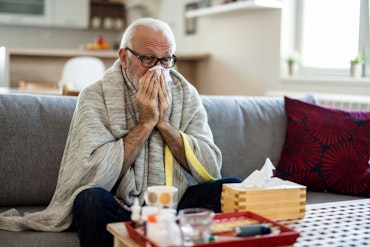Women’s Health Week aims to see women open up about wellbeing
Women’s Health Week for 2018 has now kicked off with the aim of helping women open up about their wellbeing and be proactive about health screenings.

Common health problems in older women should also be a topic of conversation during Women’s Health Week 2018 (Source: Shutterstock)
From 3-7 September, over 2,100 events will be held across Australia, with more than 100,000 women taking part in morning teas, health checks and group training sessions. Over 25,000 have registered to receive free health-related content including videos, podcasts, stories, recipes and more.
Women’s Health Week is an annual campaign founded by Jean Hailes for Women’s Health, a not-for-profit organisation dedicated to improving the lives of women throughout all stages of their lives.
Chris Enright, head of Education and Knowledge Exchange for Jean Hailes for Women’s Health, says the week encourages women of all ages to focus on their health and wellness.
“Women’s Health Week is a national health campaign for all women. We can be so busy taking care of others that we sometimes forget to find the time for our own health,” she says.
“[The week] aims to help women to open up about their health and discuss topics they may not normally discuss.”
Themes for the week include hormone health, mental wellbeing, pelvic floor health, fatigue, exhaustion and ‘silent’ topics such as endometriosis and polycystic ovary syndrome.
While Women’s Health Week encourages women of all ages to focus on their health and wellbeing, there are some common health problems in older women that should also be a topic of conversation.
“Recently, dementia overtook heart disease as the number one killer of women in Australia. In the growing trend of chronic disease affecting women today, many are linked to a poor diet, inactivity and an unhealthy body weight,” Ms Enright says.
Another concern is bone health in women, which she says “can start to decline as we age, increasing the risk of osteoporosis and bone fractures in later life. So obviously this is a big issue for older women.”
The week encourages women to get their annual health screening, as well as talking to a general practitioner (GP) about any issues or concerns, including mental and emotional wellbeing.
“Health screening for women in their 50s and over should include bowel, breast and cervical cancer screening, blood pressure check, diabetes and cholesterol tests, and STI screening,” Ms Enright says .
“Your genes and genetic inheritance can [also] play a significant role in your health.”
A survey conducted after Women’s Health Week in 2017 found that 80 percent of people had implemented positive health change because of the information communicated throughout the week.
Jean Hailes for Women’s Health also launched The Jean Hailes Women’s Health Survey on 1 September, revealing deep insights into the health and wellbeing of women across Australia.
Of the 15,000 women surveyed, 50.8 percent described themselves as overweight or obese, while 46.1 percent say they have been diagnosed with depression or anxiety by a doctor or psychologist.
Close to 10 percent of women admitted to drinking daily, with women over the age of 51 most likely to.
A large amount of women surveyed (66.9 percent) say they felt “nervous, anxious or on edge every day or on more than seven days in the past four weeks”. Close to 56 percent of women aged 80 and over say they did not experience these feelings.
“These findings help us to understand the behaviours of women in relation to their health, and importantly, how we can help them to lead healthy lifestyles,” Ms Enright says.
“At Jean Hailes, we are big believers in being proactive to maintain optimal health. Get to know your own body and what’s ‘normal’ for you. Talk to your GP about any abnormal changes and ensure you get regular checkups.”
Landmarks across the country are also turning pink to celebrate Women’s Health Week, including Flinders Street Station in Melbourne, Sydney Town Hall, Canberra Royal Mint and SkyCity Adelaide.
For more information, or to find an event near you, click here.











![The new Aged Care Act exposure draft is slated for release in December of 2023, but advocates hope to see it rolled out on January 1, 2024. [Source: Shutterstock]](https://agedcareguide-assets.imgix.net/news/articles/wp/agedcareact__0811.jpg?fm=pjpg&w=520&format=auto&q=65)












Comments